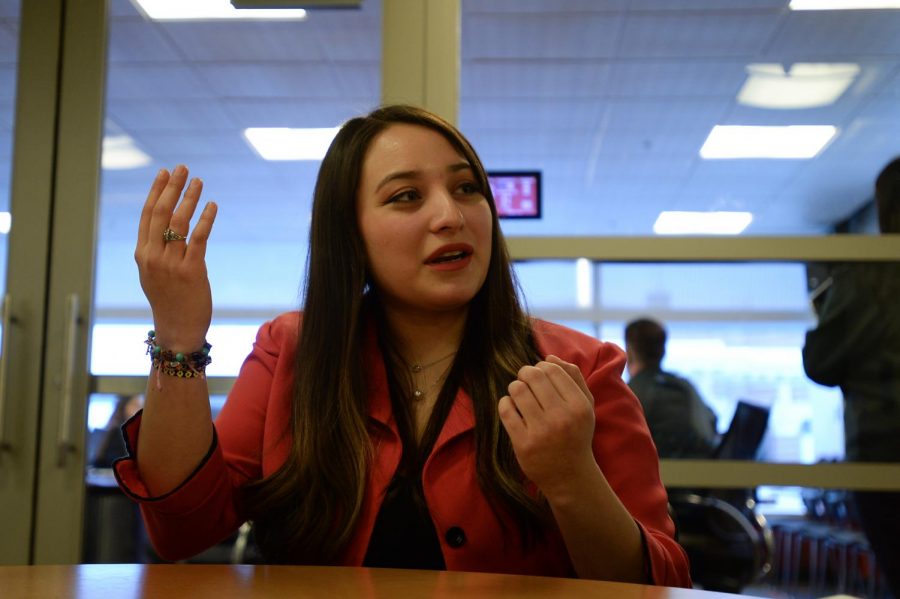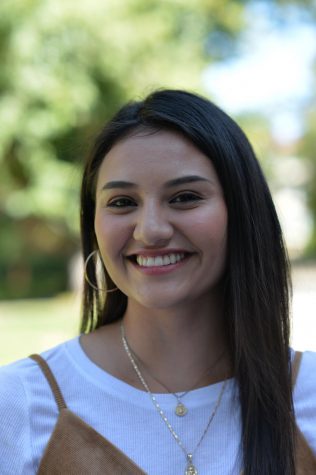Group leads art therapy for undocumented students
Creative space to relieve stress, encourage students to find way to express themselves
OLIVER MCKENNA | THE DAILY EVERGREEN
Maria Celeste Estrada, undocumented initiatives ambassador and Cougs Rise peer mentor, talks about the objectives and projects the Mariposa Creative Care program plans to undertake Monday in the CUB.
March 6, 2019
A WSU student created a project called Mariposa Creative Care, which provides art therapy workshops for undocumented students and allies on Fridays.
Mariposa Creative Care was created under Undocumented Initiatives, which is part of an advisory board for undocumented students to improve retention and graduation rates, as well as create pathways for success, Undocumented Initiatives Ambassador Maria Celeste Estrada said.
Estrada is also a Cougs Rise peer mentor and is interested in art therapy as a way to relieve stress.
“I knew that [creating art] helped me so much my junior year, and so I wanted to bring that to other students because I know that a lot of our students are really creative,” Estrada said. “I wanted them to have a space where they can be creative and heal from a lot of things.”
She said she stepped down as the Crimson Group’s social co-chair in 2017 because it was a difficult time for Crimson Group members. When people hold in their emotions, it can affect them emotionally and mentally.
“I have experienced that personally, where I just feel like my focus was so much around ‘I’m just undocumented,’ ” she said. “What I like to emphasize in my art is that you’re more than undocumented. You’re a sister. You’re a daughter. You’re a student.”
The program is a way for students to feel like they have a safe space to recover and express themselves, Estrada said.
Undocumented Initiatives Ambassador Linda Vargas said these workshops are meant to encourage students to seek help or find a way to express themselves through art. In addition to being an ambassador, Vargas is also a Crimson Group representative.
“Often, these mental health issues are not really talked about in our community,” she said. “They’re put off to the side, [and] you’re looked at as weak if you have any type of mental issues you’re going through, especially depression.”
Estrada said they started the initiative this semester and will continue to develop the program and sustain it.
Vargas said she wants to implement more ways to cope with stressful situations next year when she takes over for Estrada, who will graduate this year.
“[They want to encourage] people to find what their niche is when it comes to these issues, like what helps them reboot, what helps them get back to that healthy mental state,” Vargas said.
One workshop, called “Rebirth of Color,” involved students writing negative words they associate with themselves on a blank canvas, which was then painted over in black and repainted with other colors, Vargas said.
“You’re letting go of all that dark stress, that negativity in your life, and you’re turning it into something beautiful through color,” she said.
Marcela C. Pattinson, Undocumented Initiatives assistant director for community relations and outreach, said the initiative ambassadors work to create a foundation for students, so they have the opportunity to make informed choices.
“We always work to get tools and resources necessary for students to be able to advocate for themselves,” Pattinson said.
Vargas said undocumented students can often struggle with their identity.
“One of the main things we want to achieve through these workshops is encouraging students to tell their stories and teaching them how to tell their stories,” she said.
Vargas said undocumented students can come to terms with their status at different points in their lives, but it takes time to be comfortable enough to share that part of themselves.
“I struggled a lot with my identity growing up,” she said. “That was something that I kept to myself. I never talked about it, and when I finally was OK with saying it out loud, I started getting really involved in leadership and advocacy.”
Estrada said they hope to have their own center so it could be more accessible for students to use.
Vargas said they hope to expand this program to reach other undocumented groups and communities because the population extends beyond the Latino community.
Estrada said workshop ideas come from her blog. They hope to collect student evaluations by next year to learn how workshops have strengthened resiliency or helped relieve stress.
This story has been updated to correct the headline.










